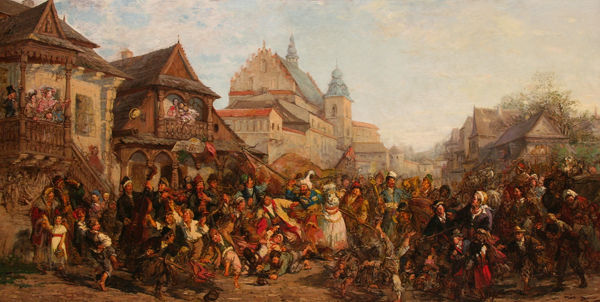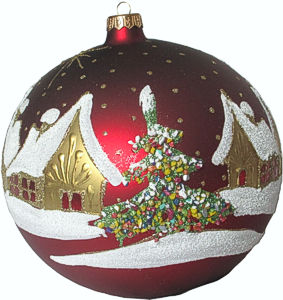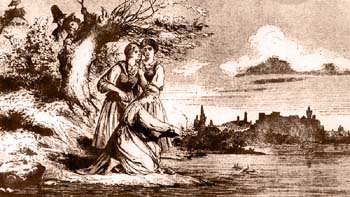|

Painting by
Polish artist Hipolit Lipinski (b. 1846, d. 1884) shows the
lively pageant of
Lajkonik in
Krakow in the 19th century.
Traditional Customs and Festivals in
Krakow
Krakow region has always been rich in colorful folk traditions,
handed down from generation to generation.
Christmas
Eve’s night begins with a family feast of 7-12 special
dishes–no red meat and at least one course of carp–followed by
presents unwrapping and carols singing, and it ends with popular ‘pasterka’,
i.e. the midnight ‘Shepherds’ mass’, in a favorite
Krakow church
(or simply the nearest one). Christmas and notably the following
holiday on December 26th are traditionally occasions in Poland for
visiting friends and relatives. In the ensuing holiday season also
popular are such family pastimes as Nativity plays, seeing elaborate
Nativity scenes in various Krakow churches
and the museum display of the best examples of famous
Krakow cribs
built over the last year.

New Year
merrymaking is a must worldwide but on that night Krakow’s entire
Old Town
historical district turns into one giant ballroom.
Thousands of revelers swarm its huge
Grand Square
with the adjacent streets in frenzied rejoicing and pack into the
area’s countless clubs, cafes and restaurants. Such is the beginning
of Krakow’s long carnival season which ends with the Shrove Tuesday
frolics weeks later.
Kolednicy’ carol singers, mostly children, wander
with a
Christmas crib
from door to door over the holiday season. In reward for chanting a
couple of Polish traditional noels they get some change. In the past
the kolednicy used to be adult and they performed an elaborate
Nativity puppet show.
Fat Thursday, the last one before the Ash Wednesday,
is a festival of overeating when every Krakow dweller devours the
Fat Thursday specials: ‘favorki’ crunch cakes and the Polish
doughnuts (balls with rose-petals jam filling) which are a must-eat
treat on that day.
Shrovetide (Polish ‘Ostatki’ or ‘Zapusty’)
crowns Krakow’s two-month carnival season. The Shrove Tuesday’s ‘sledziowka’
festivities traditionally last till dawn on the Ash Wednesday and
they end with the Lent meal of herring after which repentant
revelers go straight to the church to have their foreheads strewn
with ash.
Lent’s 40 days are marked by profusion of special services
and ceremonies in beautiful
Krakow churches,
culminating over the Holy Week, notably in the Good Friday’ mournful
rituals. Most striking is the hooded procession of the 400-year-old
Archfraternity of Lord’s Passion, known also as the Brothers of Good
Death, held every Friday throughout the Lent at the 13th-century
Franciscan church
in the very heart of the city.
Easter
festival spreads over four days in Krakow. On the Holy Saturday
everybody visits the parish church with a basket of the traditional
Easter foodstuff–bread, eggs, ham, sausages, and a piece of
horseradish–to have them consecrated by priest, and to see ‘the
grave of the Lord Jesus’ arranged in a chapel or a crypt. Easter
Sunday traditionally remains quiet and confined to the family and
the church. Yet Easter Monday is devoted to socializing, the
centuries-old
Emaus fiesta
being the chief venue. Also Poland’s tradition is splashing water
over one another on the Easter Monday; teenagers do it with zest and
by bucketful. Another Krakow’s time-honored fair, called
‘Rekawka’,
takes place on Tuesday after Easter.
‘Smigus’ means Poland’s universal custom of
splashing over one another with water on the
Easter
Monday. In the past village boys used to drench girls for good luck
in finding a husband, whipping them first with willow rods.
All Fools’ Day on April 1 or ‘prima aprilis’ is universally
observed in Poland: expect endless pranks, jests, and innocent lies.
Lajkonik Parade on the first Thursday
after the Corpus Christi feast proceeds for about three hours from
the Zwierzyniec
Premonstratensian convent of St Norbert
to the central
Grand Square,
accompanied by loud and high-pitched music. Participants sport
either Krakow folk costumes or fancy oriental attire. Lajkonik is
their leader–bearded fellow in a Tartar disguise rides a wooden
horse and prance joyfully around.

Wreath floating is
Krakow's ancient summer-solstice tradition.
Wreaths (‘Wianki’)
Midsummer festival is the Krakow variety of Poland’s
traditional all-night merrymaking by bonfires on St. John’s Day,
June 24. In Krakow it has always started with girls floating wreaths
of magic herbs with lit candles down the Vistula river. Since the
19th century the
ancient custom
has turned into a popular fiesta and a great show with musical acts
and fireworks display upon the riverbank opposite the
Royal Wawel Castle.
‘Zielone Swiatki’ Whitsunday feast is the occasion
for joyful gatherings at night by numerous bonfires.
‘Andrzejki’
universal partying on the night of St Andrew’s Day, November 30, has
folk origin, reminded at a break in dancing by fortune-telling from
shapes melted wax takes poured into water.
All Saints’ Day, November 1 (as well as, to a lesser
degree, All Souls’ Day, November 2) is spent in Poland on visiting
cemeteries and commuting between them. Everybody prays at graves,
decked with fresh flowers for the occasion, of the deceased
relatives, and lights candles.
‘Mikolaj’ on St Nicholas’ Day, December 6, has been always
the date when children in Poland expected Santa Clause bringing
gifts. Except nowadays Santa usually bothers again on the
Christmas Eve.
Newly built famed
Krakow Christmas
cribs–tens of them, from tiny to giant–can be seen before noon in the
first ten days of December round the
Grand Square’s
monument to Adam Mickiewicz. Successful entries for the yearly.
|
Krakow's Lifestyle
Matter-of-fact as they
are in their work habits, and while family and family life remain most
dear to them, Krakow dwellers
generally relish good company, good
food, and having plenty of free time.
Tips on manners in Krakow
Krakow Festivals
Hardly a month passes in Krakow without some time-honored occasion
for common festivities or colorful celebration.
Carnival in Krakow
Krakow
residents enjoys a long season of merriment that lasts from the New
Year’s Eve till the Shrove Tuesday some two months later. It is
marked by feverish partying in Krakow’s numerous clubs on the one
hand, and snobbish charity balls on the other.
Krakow news
Updates on current and upcoming events
Culture Festivals in Krakow
Krakow Christmas
Krakow Easter
Good hotels in Krakow
Best restaurants of Krakow
|





